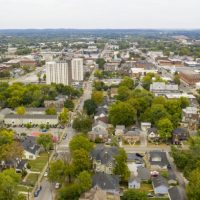Planning a move to Louisville, KY?
Much good can be said about this charming city located on the Ohio River along the Indiana border.
The city’s historical architecture, lush, green parks, and exceptional food would appeal to anyone!
Then there’s the Kentucky Derby and Bourbon Festival to look forward to!
Before adding to Louisville’s liberal population, it’s good to consider the city’s good points and bad.
Here’s a lowdown of some of the pros and cons of living in the “Derby City.”

Contents
Pros of Living in Louisville, KY
There are a lot of good points about moving to Louisville.
Some points may appeal to you more than others.
Knowing what to expect can help you prepare for any eventuality.
1. Healthy Economy
Louisville has a thriving economy that looks promising for the future.
Jobs can be found in industries like government, healthcare, manufacturing, distribution, and education.
UPS, Norton Healthcare, Yum Brands, U of Louisville, and Jefferson County Schools are a few of the city’s top employers.
Although jobs are readily available, the pay may not be to your liking.
The median household income is 10% lower than the U.S. average.
But your money may go even further here because of the city’s . . .
2. Modest Cost of Living
It’s less expensive to live in Louisville than other cities in the country.
This is due in part to affordable housing.
Houses here cost 30% less than the national average, ranging from $150,000 to $300,000.
Groceries, utilities, healthcare, and other basic needs are cheaper as well.
A low cost of living makes it easier for families and college grads to get established.
Entrepreneurs can take advantage of low real estate costs to launch their businesses.
3. Good Tax Laws
A city that offers tax breaks to homeowners and businesses is always worth exploring.
Louisville’s tax abatement program, homebuyer savings account, and homestead exemption are a plus for developers and home buyers.
The city has no local income tax, leaving more money in residents’ pockets.
Some aspects of retirement income are also tax-exempt, making life easier for seniors on a budget.
Property taxes are low due to reduced property costs, but there is a 6% sales tax that impacts everyone.
4. Reasonable Property Costs
Louisville has properties conducive to almost any budget.
Here you can find comfortable, attractive homes at reasonable costs.
You don’t have to sink a large amount of money into a house or contend with a huge mortgage.
Louisville homes reflect the area’s unique architectural styles ranging from “shotgun shacks” to Federal-style designs.
Prices range from $150,000 to $300,000+ depending on the location, size, and design of the home you desire.
5. Access to Higher Education
Louisville is home to a number of colleges to further your education.
The U of Louisville offers undergrad and graduate programs in healthcare, engineering, business, and other majors.
The private schools of Bellarmine University and Spalding University offer studies in liberal arts.
The historically Black institution of Simmons College of Kentucky offers degrees in education, business, and liberal arts.
A 2-year degree from Jefferson Community & Technical College can kickstart your career in AC repair, construction, auto technology, welding, and other trades.
6. Festivals & Attractions
There’s no shortage of festivals and attractions in Louisville to pique one’s interest.
The Kentucky Derby, one of the most famous horse races in the country, is a star attraction.
The city hosts a number of festivals annually of which the Forecastle Music Festival, Louisville International Festival of Film, and Bourbon Festival are prime examples.
The Kentucky State Fair is a year-round celebration that offers food, fun, and entertainment for the entire family.
7. Fun Things to Do
If festivals aren’t enough to keep you busy, here are some more things to add to your calendar.
Check out local museums like the Kentucky Derby Museum, Louisville Slugger Museum, and Conrad’s Castle.
Watch a sports game at the stadium, like the Louisville City Football Club (soccer) or the Louisville Bats (baseball).
Explore the great outdoors at Cherokee Park, Louisville Waterfront Park, or Jefferson Memorial Forest.
8. Great Food Scene
Foodies will find Louisville, KY a food lover’s delight.
The city recently joined the ranks of the top 10 Foodie Cities in the country.
Louisville houses such award-winning eateries and restaurants as Decca, 610 Magnolia, and Milkwood.
The city’s culinary delights range from traditional Southern dishes to American classics to international cuisine.
Louisville even has its own signature dishes like the Hot Brown Sandwich (made with turkey, bacon, and Mornay sauce) and Derby Pie.
And let’s not forget the flourishing Bourbon industry, with distilleries and pubs that offer tours and tastings.
9. Welcoming Environment
Another plus of living in Louisville, KY is its warm, welcoming environment.
Louisville is a friendly community that makes people feel at home.
The people are known for being helpful and hospitable, which is part of the city’s southern charm.
A welcoming atmosphere makes Louisville a good place to raise your family.
Cons of Living in Louisville, KY
So, what’s the negative side of living in Louisville, KY?
1. High Crime Rate
Property and violent crime are double and triple of what you’ll find in other cities in Kentucky.
This makes Louisville a very dangerous place to live.
High crime areas include the Hallmark, Jacobs, Shawnee, Limerick, and Park Duvalle districts.
In these areas, one out of every seven people is at risk of becoming a victim of crime.
By increasing policing and neighborhood watches, the city hopes to turn these areas around.
In the meantime, an investment in home security can help protect you and your family.
2. Tornadoes & Floods
Louisville is prone to severe thunderstorms and tornadoes in spring and summer.
By staying abreast of weather conditions in your area, you can prepare accordingly.
You should also have a safety or evacuation plan in case of tornado warnings.
As Louisville is close to the Ohio River, there’s also the risk of flooding from heavy rainstorms.
Keeping track of weather alerts is key to escaping these natural disasters.
3. Poor Public Transport
If you’re moving to Louisville, bring a car (or two) to get around.
Only a small percentage of the population takes public transport here.
That’s because the bus system is slow, inefficient, and unreliable.
Chances are you’ll arrive at your destination late when taking a bus.
With your own vehicle, you’re in greater control of your outcome.
But then, everyone driving their own vehicles presents a problem with…
4. Traffic
Louisville has a population of 600,000+.
If the majority of licensed drivers use their car for work or school, it can cause congestion.
Congestion can lengthen your commute to and from work which can try your patience.
During rush hour, it’s common to sit in traffic jams.
Traffic is even more intense during special events like the Kentucky Derby, as visitors will add their vehicles to the mix.
5. Poverty
Poverty is another problem common in the Louisville area.
Around 15% of the city’s residents live in poverty.
In 2023, Kentucky was listed among the top ten poorest states in the country.
In Louisville, approximately 93,000 people of a population of 600,000+ live below the poverty line.
Where there’s poverty, crime, and homelessness will follow.
6. Homelessness
Homelessness has been a major problem in Louisville for years.
Over the last 3 years, homelessness has increased by 40%.
In the first few months of 2023, the homeless population in the Metro area more than doubled.
The lack of affordable housing is a major contributor to the homelessness problem.
7. Allergies
Every year, the Asthma & Allergy Foundation compiles a list of “worst cities in the U.S. for spring allergies.”
Louisville is usually on it.
This year Louisville took the #2 spot, second only to Jackson, MS.
The reason for severe outbreaks of allergies and asthma?
Bluegrass, for which the state is famous, as bluegrass is a major source of pollen.
A high pollen count is what triggers allergy and asthma symptoms.
Due to climate change, allergy season is now 4 weeks longer in Louisville, further aggravating this problem.
8. Low Salaries
In general, salaries in Louisville, KY are lower than salaries in other parts of the country.
The average salary in this city is around $39,000, or roughly $18.75 an hour.
Entry-level positions tend to start around $30,000, with wages increasing as you earn experience on the job.
According to Salaryexplorer.com, a quarter of the workforce in Louisville makes less than $50,000.
For a family of four with only one income provider, it’s hard to make ends meet at such a low salary.

Pros and Cons of Living in Louisville, KY – Summary Table
| Pros of Living in Louisville, KY | Cons of Living in Louisville, KY |
|---|---|
| 1. Healthy Economy | 1. High Crime Rate |
| 2. Modest Cost of Living | 2. Tornadoes & Floods |
| 3. Good Tax Laws | 3. Poor Public Transport |
| 4. Reasonable Property Costs | 4. Traffic |
| 5. Access to Higher Education | 5. Poverty |
| 6. Festivals & Attractions | 6. Homelessness |
| 7. Fun Things to Do | 7. Allergies |
| 8. Great Food Scene | 8. Low Salaries |
| 9. Welcoming Environment |
Louisville Safety Overview
READ THE FULL REPORT: Louisville Safety Review
Safety Index:
- OVERALL RISK: MEDIUM
- TRANSPORT & TAXIS RISK: LOW
- PICKPOCKETS RISK: MEDIUM
- NATURAL DISASTERS RISK: MEDIUM
- MUGGING RISK: MEDIUM
- TERRORISM RISK: MEDIUM
- SCAMS RISK: LOW
- WOMEN TRAVELERS RISK: MEDIUM
Frequently Asked Questions
Why are people relocating to Louisville, KY?
According to Trulia.com, Louisville is the third most affordable place to live in the country.
The city has a thriving economy, interesting attractions, parks for the kids, and top-rated colleges.
And it’s home to the Kentucky Derby and Kentucky bourbon – who could ask for more?!
How much income do I need to live comfortably in Louisville, KY?
Singles can live here comfortably with a monthly income of around $1,600.
Affordable housing, rents, food, transport, and utilities make Louisville an affordable place to live for college grads and families.
Retirees will find their pension stretches more here than other cities in the country.
What kind of jobs can I find in Louisville, KY?
Jobs are available in such industries as healthcare, engineering, IT, education, and manufacturing.
Corporations that are headquartered in Louisville include Brown-Forman, Republic Bank, Norton Healthcare, Humana, and Yum Brands.
Does Louisville have any colleges?
Yes!
The U of Louisville is a public 4-year college offering Associate, Bachelor, and Master’s degree programs.
The private institutions of Spalding University and Bellarmine University offer majors in business, education, nursing, and natural sciences.
You can also learn a technical trade at Jefferson Community & Technical College to kickstart your career in the industry of your choice.
What are the neighborhoods like in Louisville?
The Derby City has neighborhoods for every lifestyle.
The downtown district is a hotspot for fine dining, trendy bars, and live entertainment.
It often appeals to the young professional or single crowd.
Aspects like quality schools and parks are more appealing to families.
These aspects can be found in family-friendly neighborhoods like Clifton Heights and Bonnycastle.












I’ve lived in Louisville for several years and can attest to the vibrant culture, friendly locals, and the rich history of the city. It’s a unique place to call home.
One of the biggest pros is the thriving food scene, and the Kentucky Derby is an excellent like no other. Louisville offers a diverse and enjoyable lifestyle.
Thanks for sharing this list. It’s a helpful resource for those weighing the decision to move to Louisville. Every city has its pros and cons,but it’s all about finding the right fit for you.